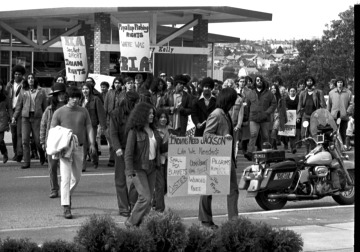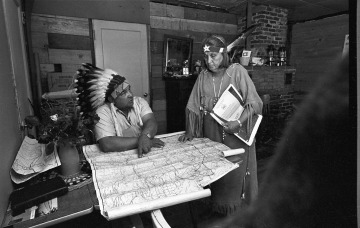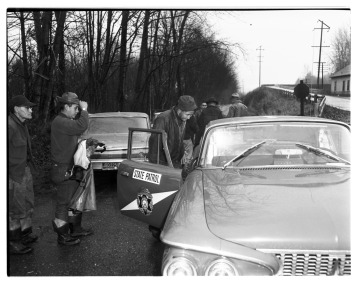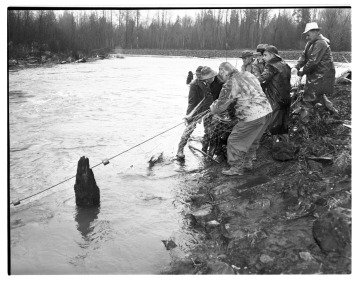1964: Police brutalize tribal fishermen in Washington State
Local police brutalize tribal fishermen on the Puyallup River at Frank’s Landing, near Tacoma, Washington. Hank Adams, spokesman for the Survival of American Indians Association, sends an open letter to incoming Washington governor Dan Evans, informing him that Frank’s Landing is being posted against trespassing and that an armed guard is being stationed to prevent opposition by police officers.
Messages from Frank’s Landing: A Story of Salmon, Treaties, and the Indian Way (2000) by Charles Wilkinson describes the life of the Nisqually environmental activist Billy Frank Jr. (b. 1931) and includes a photo essay by Hank Adams.
- Theme
- Native Rights
- Region
- Northwest Coast
Native Americans protesting against violation of various rights outside the Bureau of Indian Affairs office, 1971
Courtesy Seattle Post-Intelligencer Collection, Museum of History & Industry
Stillaguamish chief Frank Allen and Esther Ruth Ross point to an area on map they say belongs to the Stillaguamish tribe. They are planning a fish-in to protest the tribe’s loss of fishing rights on its ancestral lands, 1968.
Courtesy Seattle Post-Intelligencer Collection, Museum of History & Industry
Indians being arrested for fishing on the Nisqually River, southwest of Tacoma, Washington, 1962. In the 1960s and 1970s, the Nisqually pursued their fishing rights along the river, which were stated in the Treaty of Medicine Creek but had been ignored. Nisqually tribal members, working with the nearby Puyallup tribe, endured harassment and arrests to fish in their traditional waters.
Courtesy Seattle Post-Intelligencer Collection, Museum of History & Industry
Indians fishing along the Nisqually River, 1962
Courtesy Seattle Post-Intelligencer Collection, Museum of History & Industry



